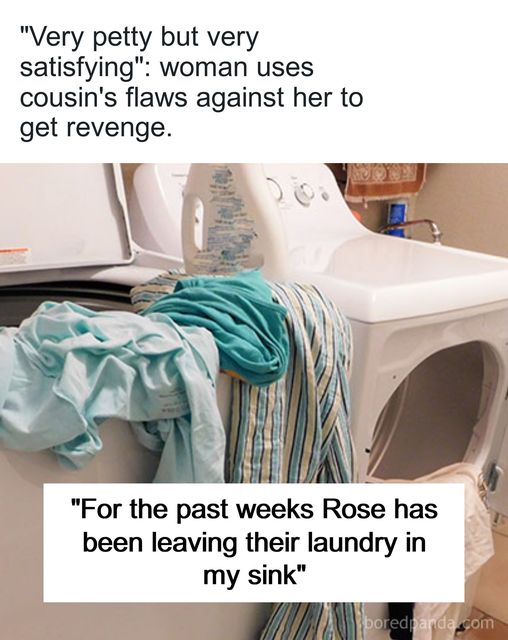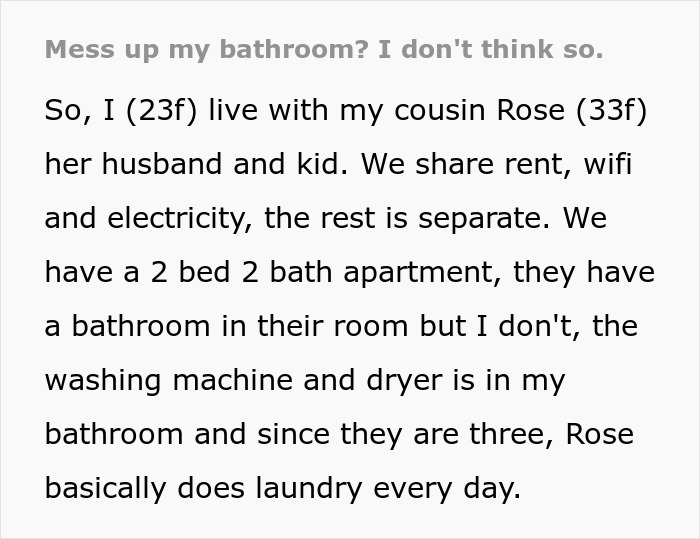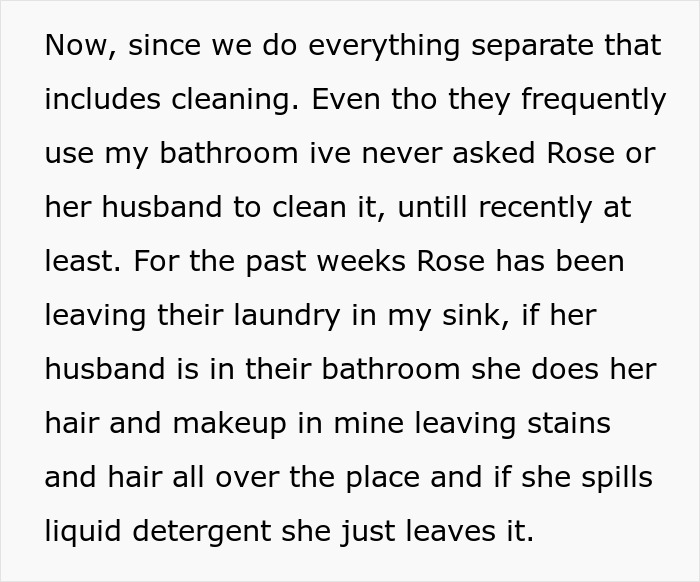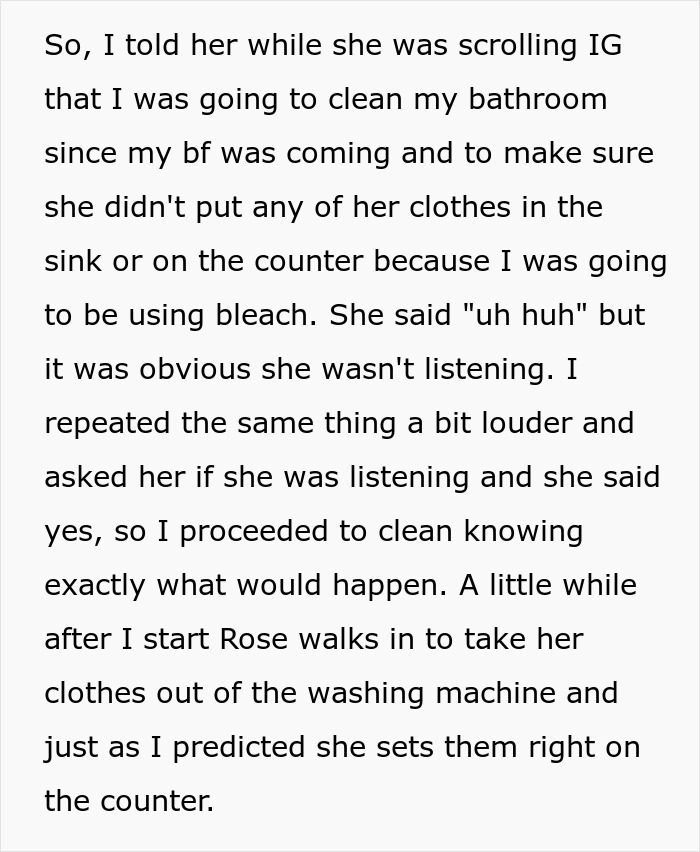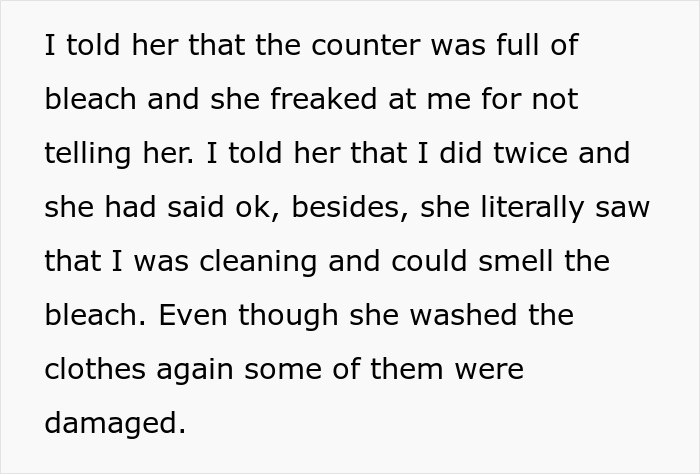Living with other people isn’t always easy. And a little courtesy and consideration can go a long way. Basic things like picking up your stuff, cleaning your own mess and not stealing food or clothes could potentially hold the golden key to unlocking a more peaceful household.
One woman was at her wits’ end with her cousin, who just refused to clean up after herself. So she cooked up a cold dish of petty revenge. Armed with a bottle of bleach, and the knowledge that her cousin doesn’t always listen, the woman took advantage of the situation. She figured if she had to clean up after her untidy housemate, she may as well teach her a permanent lesson.
The house has two bathrooms but the washing machine is in the woman’s one, so her cousin is constantly in there
Image credits: AZ-BLT (not the actual image)
The cousin never cleans up after herself and is forever leaving a giant mess behind
Image credits: Anton (not the actual image)
Image credits: Pressmaster (not the actual image)
Image credits: Glittering-Crow-1899
There are unwritten rules when it comes to sharing a home with other people
“Do unto others as you would have them do unto you”. Or treat others the way you want to be treated. It seems like a perfect fridge magnet for housemates who need a daily reminder that they are not the only ones roaming the rooms of their shared home.
One student survey found that the top two most annoying housemate habits are leaving dirty dishes out and not helping with cleaning. Basically, being a lazy, untidy slob with zero consideration for others is bound to rub your roommates up the wrong way.
“Basic cleanliness is expected when living with another person,” says etiquette expert Diane Gottsman. “Pick up your wet towels from the floor, make your bed every morning and wash your dishes after each meal. Your roommate has the same busy schedule you do, and they did not sign up to be your housekeeper.”
“Create a cleaning schedule clearly outlining who is responsible for cleaning which areas and on what days,” reads one rental blog. “This ensures that everyone contributes equally and that shared spaces are regularly maintained.” It adds that everyone should make it a habit to clean up after themselves “immediately after using a shared space or resource, such as washing dishes or wiping down counters.”
Image credits: Mizuno K (not the actual image)
There’s no point in having a cleaning schedule if the communication is lacking
Many experts agree that communication is key when it comes to living with someone. Clear rules and boundaries should be set from the very beginning. “There should be no major surprises,” warns Gottsman. “Determine how to split the bills, who gets the reserved parking spot and how many people will be responsible for paying the rent.”
It’s also important to be transparent about any habits, routines, or pet peeves you have. Gottsman adds that extra guests can cause unexpected issues, and it’s best to discuss this upfront. All housemates should state their comfort level when it comes to visitors, boyfriends or girlfriends staying over for extended periods.
There should also be a plan to handle any problems that might arise. “Disagreements are inevitable, but it’s important to handle them maturely and respectfully,” reads the rental blog. “Come up with rules for conflict resolution, such as agreeing to always listen to each other’s perspectives and taking a break if things get heated.”
Image credits: Jessica Lewis 🦋 thepaintedsquare (not the actual image)
Being passive aggressive is unlikely to help solve problems with your housemate
Experts suggest handling issues as soon as possible. Don’t let them stew. If someone does something that annoys you, speak up. “You do not have to let it become a fight or talk to them in a mean or aggressive way. But, you should let your roommate know how you feel,” advises the neighbor.com site. “Ask yourself whether you are being too sensitive. If the answer is ‘No’, then you should speak up. Just make sure you do so politely and quickly. Otherwise, resentments and bad behaviors will accumulate.”
One suggestion is to have regular household meetings. Almost like family, or work meetings. It’ll give everyone a chance to raise any issues, update their housemates, plan future events, or even just check in to make sure everyone is fine and there are no miscommunications.
Image credits: RDNE Stock project (not the actual image)
